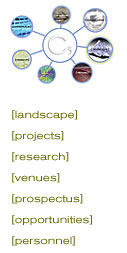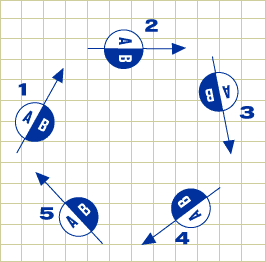 |
Ubiquity: Measured/Measure
Keywords
observation, measurement, relative systems, quantum systems, Panopticon, equilibrium, hierarchical advantage
Description
Observation and measurement using procedures defined by classical systems and objective viewpoints are no
longer seen as describing behavior with certainty. These disciplines are now performed using relativistic,
uncertainty, and probability models. Measurements extracted from observation must be analyzed within
the relative context of who or what is making the observation.
Quantum theory provides one of the most fundamental models of how we can actually measure anything. As the uncertainty principle states: to accurately measure an attribute of any object with detail, means giving up accurate information on its other attributes. Because of this, measuring all attributes of an object simultaneously proves elusive. In addition, quantum theory demonstrates that the act of measurement on any object is affected by that measurement. Therefore, the process for measurement is dynamic and ongoing, becoming a system of continual observation, measurement and evaluation.
The 'Panopticon' described by Foucault, contains a similar valuable understanding of observation and measurement. In surveillance systems where the observer performs acts of observation, with the subject 'knowing' of this observation, one will find the behavior of the subject affected or changed by the act of observation. In this case, a self-conscious behavior is set in motion. In observation and measurement one must take into consideration whether the information extracted is affected by the subject affected by that act of observation.
Espionage is a good example of the critical importance of understanding the observed and observer or measured/measure. A spy is only as valuable as the coherence of information they provide. Strategies of counter-espionage often involve reverse strategies. Rather than stopping the flow of information when a spy is revealed, disinformation is used to misdirect, while the original dynamic of surveillance remains intact. This system of observer watching the observer, watching another observer, etc, often creates a circular or looping path of surveillance: a self-contained system of observation, analysis and reevaluation.
In the case of these systems, each observer/subject or node is looking for a hierarchical advantage or non-equilibrium,
hoping to break the loop in the system. The observer who gains measurement without the subject being aware or the subject
who conceals or provides disinformation gains the advantage. We see this dynamic in many social institutions, corporations
observe employees who seek privacy and use disinformation, law enforcement observes corporations who also seek privacy and
use disinformation, media observe law enforcement, etc. It is understanding the flow and exchange of information and the
creation and negation of hierarchical structures within multiple measured/measure nodes that is so important in learning how
knowledge and meaning is gained.
